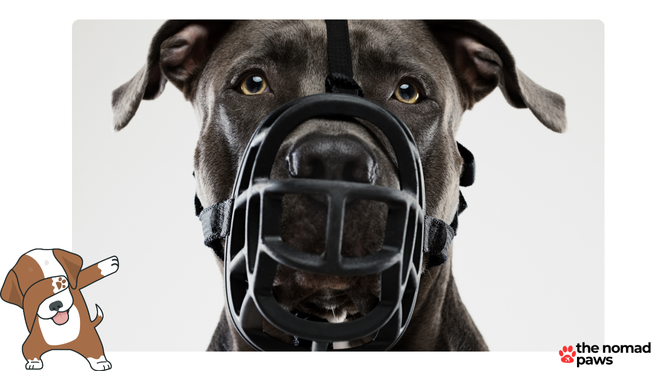Ah, pit bulls. These muscular, loyal, and often misunderstood dogs have been the subject of heated debates and varying legislation across the globe.
If you are a proud pit bull parent planning to relocate or tiy are simply curious about international breed specific legislation, you’ve come to the right place.
Regardless of your location or travel plans, providing your pit bull with top-notch nutrition from best dog food brands for pitbulls is just as important as understanding the laws that might affect them.
Today, we’ll try to make sense of pit bull regulations in different countries around the world and uncover which ones roll out the red carpet for these lovable pooches.
Countries without Breed-Specific Legislation for Pit Bulls

Before we delve into the nitty-gritty details, it’s worth noting that many countries don’t have any breed-specific legislation (BSL) targeting pit bulls.
These nations focus on responsible pet ownership rather than singling out particular breeds.
Let’s take a whirlwind tour around the world and see where pit bulls are welcome without special restrictions.
North American Countries
In North America, the situation is a bit of a mixed bag. The United States, as a whole, allows pit bulls, but it’s not that simple.
Some US states and municipalities have their own breed-specific legislation, so you need to check local laws before packing up your pibble for a cross-country move.
Canada, our friendly neighbor to the north, generally allows pit bulls.
However, Ontario has had a pit bull ban in place since 2005. So, if you’re dreaming of maple syrup and mounties with your four-legged friend, you might want to avoid that particular province.
South American Countries
South America is largely pit bull-friendly. Countries like Brazil, Argentina, and Peru welcome these stocky sweethearts with open arms.
In case you are wondering “what do I need to take my dog to Mexico,” you’ll be happy to know that pit bulls are allowed there with no particular restrictions.
In Brazil, for instance, pit bulls are not only allowed but are quite popular. However, it’s worth noting that while Brazil loves its pit bulls, they’re not too keen on feathered friends – birds are not allowed for import.
So, if you’re planning a move to Rio with your pit bull and parrot, you might need to rethink that particular combo!
European Countries

Europe is a diverse continent when it comes to pit bull regulations. Many countries, including Austria, Belgium, Czech Republic, and the Netherlands, allow pit bulls without specific restrictions. This said, some European countries have stricter rules or outright bans.
In the United Kingdom, pit bulls are technically banned under the Dangerous Dogs Act of 1991.
This does not mean that you won’t meet pitbulls in the UK – as many of these fogs are registered as Staffordshire Bull Terriers, which are legal and beloved.
It’s a bit of a “wink-wink, nudge-nudge” situation that allows pit bull lovers to keep their pets while technically adhering to the law.
Asian Countries
Asia is another continent with a variety of approaches to pit bull ownership.
Countries like Japan, South Korea, and the Philippines allow pit bulls without breed-specific restrictions.
In India, pit bulls are allowed, but there’s a catch – only cats and dogs can be imported. So, if you were planning on bringing your pit bull and your pet tiger to Mumbai, you might need to reconsider!
African Countries

Information on pit bull regulations in African countries can be a bit sparse, but many nations don’t have specific breed bans.
If you are plannings to relocate with your pit bull to an African country, my suggestion is to check with local authorities or embassies before planning any international moves with your dog.
Oceania Countries
In Oceania, the situation varies. Australia, for example, has restrictions on American Pit Bull Terriers, considering them a restricted breed. So, brining a dog to Australia is not an option if you have a pit bull.
The positive side of this? You’ll never have to worry about Australia’s infamous pet quarantine that so many dog owners fear and try to avoid.
New Zealand, on the other hand, doesn’t have a national ban on pit bulls, though some local councils may have their own regulations.
European Countries with Unrestricted Pit Bull Ownership
Let’s zoom in on Europe, where several countries have taken a more relaxed approach to pit bull ownership.
These nations have chosen to focus on responsible ownership rather than breed-specific bans.
Legal Status and Public Perception
In many European countries, pit bulls are legally recognized as just another breed of dog. There’s no special paperwork, no extra hoops to jump through (unless your pit bull is into agility training, of course).
The public perception in these countries tends to be more positive, with pit bulls often seen as family dogs rather than inherently dangerous animals.
Case Study: the Netherlands

The Netherlands is known for its progressive policies, and its approach to pit bulls is no exception.
In 2008, the Dutch government lifted a 15-year ban on pit bulls, acknowledging that the ban had not led to a decrease in dog bites. Instead, they shifted focus to owner responsibility and proper training for all breeds (here, in Dutch).
Dutch pit bull owners are encouraged to socialize their dogs from an early age and attend training classes.
The result? Well-behaved pit bulls are a common sight in parks and cafes across the country.
It’s not unusual to see a pit bull enjoying a canal-side stroll in Amsterdam or lounging in a Rotterdam restaurant patio.
Case Study: Sweden

Sweden is another country that has chosen not to implement breed-specific legislation. Instead, they focus on individual dog behavior and owner responsibility.
Swedish law requires extra attention for certain pets, including pit bulls, but this doesn’t translate to restrictions or bans.
In Sweden, pit bulls are often seen as family dogs and are popular among dog enthusiasts. The Swedish Kennel Club (Svenska KennelKlubben) recognizes the American Staffordshire Terrier, a close relative of the American Pit Bull Terrier, and these dogs regularly participate in shows and competitions.
Nations Recently Lifting Pit Bull Bans
As more research emerges about the ineffectiveness of breed-specific legislation, some countries have taken steps to lift their pit bull bans.
This shift represents a move towards more evidence-based policy-making in animal control.
Reasons for Policy Changes

The primary reason for lifting pit bull bans is the growing body of evidence suggesting that these bans don’t actually improve public safety.
Studies have shown that factors like owner behavior and individual dog training are more predictive of aggression than breed alone.
Additionally, the difficulty in accurately identifying pit bulls has made many bans challenging to enforce.
Implementation of New Regulations
When countries lift pit bull bans, they typically replace them with more comprehensive dangerous dog laws that focus on behavior rather than breed. These new regulations often include:
- Mandatory microchipping for all dogs
- Stricter penalties for irresponsible owners
- Requirements for secure fencing for all large dogs
- Increased funding for animal control and education programs
Public Response to Lifted Bans
Public response to lifted bans has been mixed. Pit bull advocates and many animal welfare organizations have celebrated these changes, seeing them as a step towards fairer treatment of all dogs.
However, some members of the public remain wary, highlighting the need for ongoing education about responsible dog ownership.
Countries Requiring Special Pit Bull Licensing/Registration

While many countries allow pit bulls without restrictions, some nations have chosen a middle ground between outright bans and unrestricted ownership. These countries allow pit bulls but require special licensing or registration.
The specific requirements vary by country, but common types of licenses and registrations include:
- Dangerous Dog Licenses: These classify pit bulls (and sometimes other breeds) as potentially dangerous, requiring owners to meet certain conditions.
- Special Breed Registrations: These require pit bulls to be registered with local authorities, often including details about the dog’s appearance and behavior.
- Owner Competency Licenses: Some countries require pit bull owners to pass a test demonstrating their knowledge of responsible ownership.
Application Process and Requirements
The application process for these special licenses usually involves several steps:
- Proof of the dog’s identity (often through microchipping)
- Veterinary certification of the dog’s health and temperament
- Proof of secure housing for the dog
- Evidence of the owner’s ability to control the dog
- Sometimes, proof of specialized insurance coverage
Enforcement of these licensing requirements varies widely. Some countries conduct regular checks on registered pit bulls, while others rely more on community reporting.
Penalties for non-compliance can be severe, often including fines, mandatory training, or even confiscation of the dog in extreme cases.
Most Lenient Pit Bull Ownership Laws Worldwide

Now, let’s talk about the countries where pit bulls are treated just like any other dog.
These nations have the most relaxed attitudes towards pit bull ownership, often coupled with strong general animal welfare laws.
Countries with the most lenient pit bull laws typically have no breed-specific legislation at all.
In these places, pit bulls are treated the same as any other breed in terms of ownership requirements, public access, and legal responsibilities.
Some of the most pit bull-friendly countries include:
- Austria
- Netherlands
- Czech Republic
- Belgium
- Finland
- Hungary
In these countries, you’ll find pit bulls living happy lives as family pets, working dogs, and even therapy animals.
Compared to countries with breed-specific legislation, these lenient nations focus on individual dog behavior and owner responsibility. Instead of blanket bans or restrictions on specific breeds, they emphasize:
- Proper training and socialization for all dogs
- Owner education programs
- Strong enforcement of general dangerous dog laws
- Support for responsible breeding practices
Impact on Pit Bull Populations
In countries with lenient laws, pit bull populations tend to be healthier and better integrated into society.
Without the stigma of breed-specific legislation, pit bulls in these countries often have:
- Better access to veterinary care
- More opportunities for socialization
- Lower rates of abandonment and euthanasia
- Improved public perception
It’s worth noting that these countries don’t see higher rates of dog attacks compared to nations with breed-specific legislation, supporting the argument that breed-specific bans are ineffective at improving public safety.
Countries Where Pit Bulls are Popular and Accepted

In some countries, pit bulls aren’t just tolerated – they’re celebrated! These nations have embraced pit bulls as beloved pets and valuable members of society.
In pit bull-friendly countries, these dogs are often seen as loyal, affectionate family pets. They’re appreciated for their intelligence, athleticism, and gentle nature with children.
In the United States pit bulls consistently rank among the most popular dog breeds, despite some areas having breed-specific legislation.
In these pit bull-positive countries, you’ll often find:
- Dog parks that welcome all breeds, including pit bulls
- Pit bull-specific meetups and playgroups
- “Bully breed” beauty contests and sports competitions
- Pit bulls working as therapy dogs in hospitals and schools
For example, in the Netherlands, you might see pit bulls enjoying a train ride with their owners, just like any other dog breed!
Nations Allowing Pit Bulls with Strict Regulations

Some countries take a “yes, but…” approach to pit bull ownership. They allow these dogs, but with a set of strict rules that owners must follow.
Muzzling Requirements
Many countries that allow pit bulls require them to be muzzled in public spaces. This rule often applies to other “powerful” breeds as well.
While some owners find this restrictive, others see it as a small price to pay for being able to keep their beloved pets.
Leash Laws
Strict leash laws are common in countries that regulate pit bulls. These often require pit bulls to be on a short, sturdy leash when in public, regardless of how well-behaved the dog might be.
Insurance Requirements
Some nations require pit bull owners to carry special liability insurance.
This is meant to cover any potential damages or injuries caused by the dog, although statistically, pit bulls are not more likely to bite than other breeds.
Effectiveness of Strict Regulations
The jury is still out on whether these strict regulations actually improve public safety.
While they may provide some peace of mind to the public, many animal behaviorists argue that breed-neutral dangerous dog laws are more effective at preventing incidents and promoting responsible ownership across all breeds.
Pit Bull Law Variations Within Countries
Just when you thought you had it figured out, here’s another wrinkle: pit bull laws can vary significantly within a single country. This can make things tricky for pit bull owners who like to travel or are considering a move.
Federal vs. State/Provincial Laws
In many countries, especially those with federal systems of government, pit bull laws can differ between national and state/provincial levels. For example:
- In the United States, there’s no federal pit bull ban, but some states and many cities have their own restrictions.
- In Canada, pit bulls are generally allowed at the federal level, but Ontario has a provincial ban in place.
Urban vs. Rural Regulations
Even within states or provinces, you might find differences between urban and rural areas:
- Some cities ban pit bulls while surrounding rural areas don’t.
- Urban areas might have stricter leash laws or muzzle requirements for pit bulls.
- Rural areas might be more lenient due to lower population density and different attitudes towards dogs.
Challenges of Inconsistent Legislation
These variations can create significant challenges:
- Confusion for owners about what’s legal where
- Difficulties in enforcement, especially in border areas
- Potential for discrimination against pit bull owners in certain regions
If you’re planning to travel with your pit bull, it’s crucial to research local laws carefully.
Considering not all airlines that allow pets in the cabin during international flights will accept your dog, you will probably have to look into airlines that allow big dogs in cabin to make your journey smoother.
International Trends in Pit Bull Legislation

As we look at pit bull laws around the world, we can see some interesting trends emerging.
There’s a growing movement away from breed-specific legislation towards laws that focus on individual dog behavior and owner responsibility.
This approach recognizes that any dog can be dangerous if poorly trained or mistreated, regardless of breed.
Policymakers are increasingly turning to scientific research to inform their decisions about dog legislation.
Studies have consistently shown that breed is not a reliable predictor of aggression, leading many countries to reconsider their breed-specific laws.
Animal welfare organizations have also played a crucial role in shaping pit bull legislation worldwide. These groups often:
- Lobby against breed-specific legislation
- Provide education about responsible dog ownership
- Offer resources for pit bull owners and potential adopters
- Conduct and promote research on dog behavior and effective management strategies






